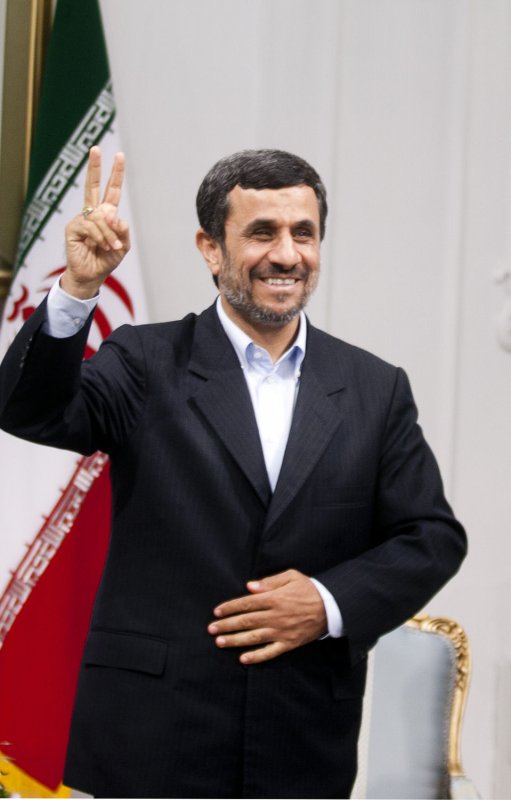1 of 2 | Iranian President Mahmoud Ahmadinejad makes a peace sign to the media before his official meeting with Masoud Barzani the head of the autonomous Kurdish region in Iraq, in presidential palace in Tehran,Iran on Oct 30,2011. UPI/Maryam Rahmanian |
License Photo
TEL AVIV, Israel, Oct. 31 (UPI) -- Amid continuing concern that Prime Minister Binyamin Netanyahu is inclined to order military action against Iran's nuclear program, a key Defense Ministry chief says, "Iran is our central threat."
The comments by Amos Gilad, director of policy and political-security affairs at the ministry, followed a report by the Hebrew-language newspaper Yediot Ahoronot that Netanyahu and Defense Minister Ehud Barak were pushing for pre-emptive strikes against Iran.
The report by veteran commentator Nahum Barnea underlined a critical rift within the defense establishment and the top political echelon over how to counter what many, Netanyahu in particular, see as an existential threat to the Jewish state.
But many in the defense establishment oppose any overt military action against Iran because they accept that it could unleash a regional war on an unprecedented scale using weapons that have never before been used in Middle Eastern combat.
Saudi Arabia and the Arab monarchies in the Persian Gulf would be endangered and Iran would threaten much of the world's oil supplies.
The United States also opposes a unilateral Israeli campaign against Iran's nuclear facilities, fearing it could get dragged into a conflict not of its choosing, and has repeatedly told the Israelis so.
That was a message forcefully reiterated by U.S. Defense Secretary Leon Panetta when he visited Israel in early October and held talks with Barak.
Gilad, who has great influence within the Israeli military establishment, stressed that countering the Iranian threat must be Israel's top defense priority.
Netanyahu, he said, "was the first who heard of Iran's forecasted move on the nuclear missile path and he sees it as a massive threat. The defense minister understands the depth of the threat as well."
The debate within the upper echelons of government over the Iranian threat was largely behind closed doors until earlier this year when the outgoing head of the Mossad intelligence service, former general Meir Dagan, went public by denouncing Netanyahu and Barak.
He was backed by other senior defense and security officials, many of whom had apparently been squeezed out of command positions over the last 18 months by Netanyahu and Barak.
According to Barnea, the current chief of the general staff, Lt. Gen. Benny Gantz, Mossad chief Tamir Pardo, Military Intelligence director Maj. Gen. Aviv Kochavi and General Security Service head Yoram Cohen all oppose action against Iran at this time.
Gilad maintained that less than a decade ago Iran did not possess missiles capable of reaching Israel; now it has hundreds of ballistic missiles with the range to hit the Jewish state with 10 minutes of launch.
"At the moment, there is no immediate nuclear threat, but there is definitely a great deal of motivation and determination for it," he said.
"Today, the status is that they're at the starting point -- they have (enriched) uranium, the knowledge is there."
He declared that Iran's supreme leader, Ayatollah Ali Khamenei, "says that Israel has no place. Iran believes that it needs to be an empire equal in strength to the United States.
"That's the motivation driving the development of Iran's missile capabilities."
The Israelis believe the Iranians seek to stockpile sufficient quantities of weapons-grade enriched uranium to make several warheads quickly in a "breakout" operation with which to attack the Jewish state before anyone's aware of what they're doing.
Commentators in Yediot Ahronot, the liberal Haaretz and other dailies have in recent days openly speculated that the hawkish Netanyahu, having won nationwide acclaim for securing the Oct. 18 release of Israeli soldier Gilad Shalit, held by Hamas since July 2006, now felt he had the country behind in taking on Iran.
Netanyahu, said Jerusalem Post military writer Yaacov Katz, feels that "Israel can now move forward to deal with some of the other strategic problems it faces in the region, such as Iran's nuclear program."
But the problem, many military strategists say, is that Israel doesn't have sufficient military force to deliver a knockout blow against Iran on its own.
Brig. Gen. Relik Shafir, who took part in the Israeli air strike that destroyed Iraq's Tammuz nuclear reactor June 7, 1981, is one: "The Israeli air force doesn't have the real strategic capability to bomb distant targets for a prolonged period of time with the required intensity and firepower."





